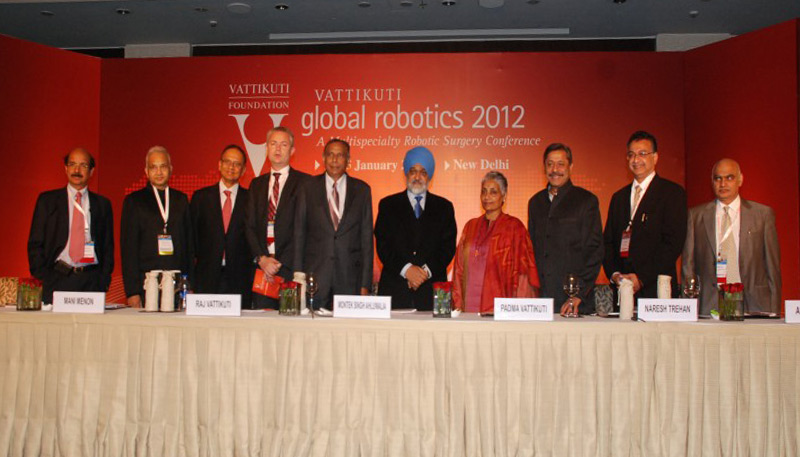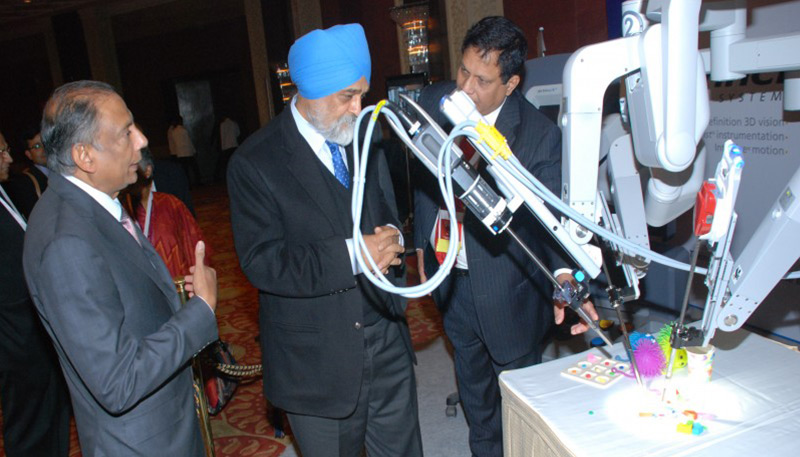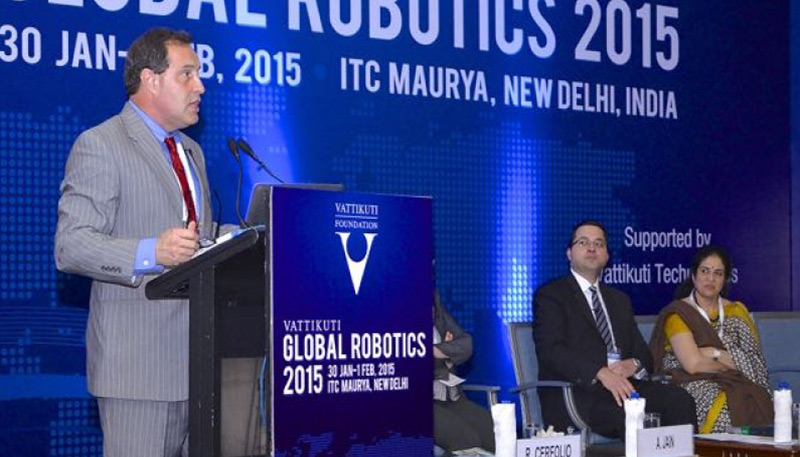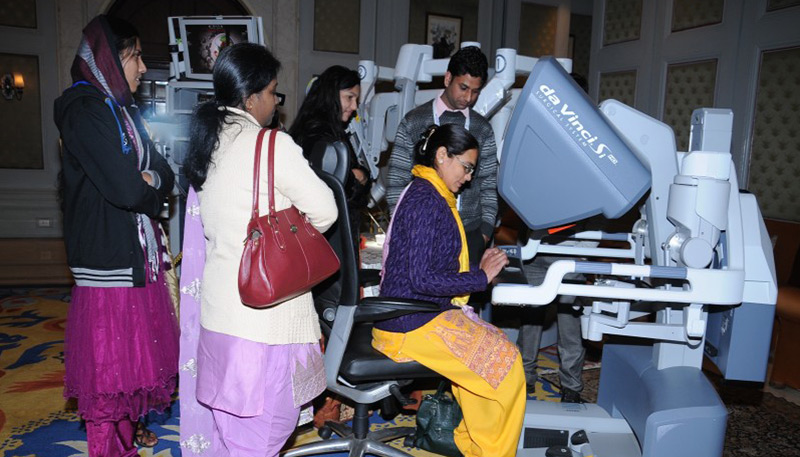New Delhi- Surgical robotics proponent Dr. Mahendra Bhandari claims that he has been asked the same question over 1000 times by laparoscopic surgeons- “We are excellent laparoscopy surgeons, why should we take to robotics?” At the Vattikuti Global Robotics 2012 Conference, two of the most recognized laparoscopic surgeons in the world answered that question- and more.
“Every open surgeon who has converted to robotic prostatectomy has not gone back to open surgery. Every laparoscopic surgeon who has converted to robotic surgery for prostate cancer has not gone back to laparoscopy”, claims Laparoscopic surgery pioneer Professor Indirbir Gill, University of Southern California Urology Department Chair.
“I can tell you that I did not believe this earlier, but now I believe the fact that we can actually do a more nuanced operation, we can actually spare the nerves, just that millimeter better, we can actually skirt the apex of the prostate nicely and get an extra millimeter or two of the urethral stump. So today I feel, that if I did a case- laparoscopic prostatectomy, and I did it robotically, I think I would do a better job robotically than laparoscopically”.
Professor C. Palanivelu, GEM Hospital Chair and Director, is the laparoscopic surgeon who Dr Gill says “Singlehandedly put India on the map for laparoscopic general surgery”. Palanivelu stated- although he has not done robotic surgery yet- “The robot will have a definite role to play, improved quality and for good performance.” He feels laparoscopy will still have a place in India, but “Robotic (surgery) is going to be”. Both agree that as volumes go up, the cost of robotic surgery will come down.
Professor Gill, who used to be called on in the U. S. when a pro-laparoscopy position was needed- admitted his conversion to robotics. He surprised the conference when he said, “I must say…, I was always the anti-robot guy, I was the reliable anti-robot discussant, but I think I am not that anymore. From my perspective, robotics is not only here to stay, robotics is here to take over. At least in the U. S., Laparoscopy is going to become extinct.”
(The complete video can be seen in the VGR 2012 videos section of the Knowledge Repository and is called- “Why Should a Laparoscopic Surgeon Think of Switching to Robotic Surgery?”)
NEW DELHI- There was a special surprise for Dr. Mani Menon during the Vattikuti Global Robotics 2012 conference. Ryan Rhodes, from Intuitive Surgical, developer of the da Vinci surgical robot, presented Dr. Menon with a Lifetime Achievement Award. Dr. Menon is known as the primary developer of surgical techniques for the robot. Rhodes thanked him for being a “pioneer”, and for training so many colleagues. “It was a significant step forward”, Rhodes said of Dr. Menon’s first robotic assisted radical prostatectomy, in 2000. He really believed that there was a better way, there was a better way to do the operation.”
“Many of Dr. Menon’s trained fellows and residents have graduated from his program and gone on, and become leaders in their own institutions.” Rhodes continued to add: “Many of the techniques that evolved were attributed to the work Dr. Menon did. He was really a pioneer and a visionary. I want to thank him, on behalf of Intuitive, but I want to thank him on behalf of the many surgeons out there, and more importantly, the patients.”
“Thousands of surgeries..., ongoing refinement and the ability to share ideas, concepts, and techniques with others around the world.” Rhodes stated were part of Menon’s accomplishments at the VUI. At that point, Dr. Menon was asked to come forward. Ryan Rhodes presented a smiling, somewhat surprised Mani Menon with a large crystal “Lifetime Achievement Award” etched with images of the da Vinci robot. “It weighs a lot. I want to thank you very much for your hard work and vision.”
“I thank you Ryan, I thank you Raj, and I thank you all. This was a great introduction, but I didn’t like it one bit, because it was all in the past tense,” said a smiling Dr. Menon. “He WAS good, he DID this,” (laughter from the audience). “…Am I dead?” Menon couldn’t help but get everyone laughing as they shared his moment. He outrageously claimed that he was a lazy surgeon, and that was the reason that he turned to robotics. Becoming more serious, he then went on to thank his wife and several colleagues as the “Wind beneath my wings.” The still-surprised honoree then complemented the Vattikuti Foundation, and thanked Raj and Padma Vattikuti, for supporting his “Crazy Idea.”
“Maybe the future is all of you,” he told the VGR 2012 conference audience. “I see Urology as just being the tip of the iceberg. We just happened to be the killer app (Vattikuti Institute Prostatectomy), Intuitive needed. But I see a vast future in general surgery, GYN is already different. I see Cardiac coming in, Vascular, ENT.” He then thanked everyone in the crowd again and left the stage with much applause.
(Compiled from VGR 2012 video coverage)
New Delhi- The Vattikuti Global Robotics 2012 Conference, the first of its kind featuring multispecialty surgical practice, is now over. The 3-day conference had over 350 attendees from across India. Dr. Montek Singh Ahluwalia, the Deputy Commissioner of the Planning Commission of India, was the inaugural speaker: “This is an example of not just making history, but making history that touches the lives of ordinary people”, he told the audience.
Nearly 60 faculty from around the globe shared their expertise with lectures, discussions, and 8 interactive live surgeries, that were observed from the conference in New Delhi. These robotic surgeries were performed at VFRSI partner institutions. The delegates had the ability to ask the team in the operating room about what they were watching live- many miles away.
“We’re just beginning to see the difference.” Dr. Mani Menon told the conference. “As sure as I am standing here, you will see the difference yourself, and you will magnify the difference.” Menon, the “Founding Father” of robotic surgery, as labeled by Time magazine, talked about his developing many of the procedures used today in robotic surgery. He also challenged the attendees: “What will you be able to do? What will the gynecologic surgeons, the ENT surgeons, vascular surgeons, the transplant surgeons, the liver surgeons be able to do? I think the future is bright. It is the tip of the iceberg.”
Raj and Padma Vattikuti were praised by several of the speakers for their efforts. Raj shared more of his goals and ideas stating- “We feel, eventually, India will be the innovation center for the robotic surgery.” He encouraged the participants: “The key thing is- for institutions to believe in it, surgeons to believe in it. You don’t need everybody to adopt it; you need to focus on the areas which can really make the difference using the robotic surgery. In no time you will be able to make this very viable and economic model.”
Another highlight of the conference was the availability of a da Vinci robot that participants could get hands-on experience- some for their very first time. Raj Vattikuti explained the robot to Dr. Ahluwalia, who earlier had acknowledged Dr. Menon for giving him his first insight into robotic surgery.
“The dream of the Vattikuti Foundation, the whole basic mission is that economic disparities do make us to live different kinds of lives. But in health, it is one of the most miserable situations.” Foundation C. E. O. Dr. Mahendra Bhandari explains. “Even the poorest of poor, should get the best of medical care. That is the mission of the Foundation.” One of the Foundation goals is to move robotic surgical technology into the public hospitals in India.
Ryan Rhodes from Intuitive surgical, the developer of the da Vinci robot, presented Dr. Mani Menon with a Lifetime Achievement Award. (Look for more in the videos section soon on this site).
The Vattikuti Foundation Robotic Surgery Institute has several partner hospitals: Henry Ford Hospitals and Providence Hospitals in Southeastern Michigan (Detroit); OLV Hospital, Aalst, Belgium; Medanta, Chennai; Asian Heart Institute, Mumbai; KIMS, Hyderabad; Apollo, Chennai; Manipal, Bengaluru; and Apollo Gleneagles Hospitals, Kolkata. (The last six all in India).
(Quotes compiled from Conference video coverage)






